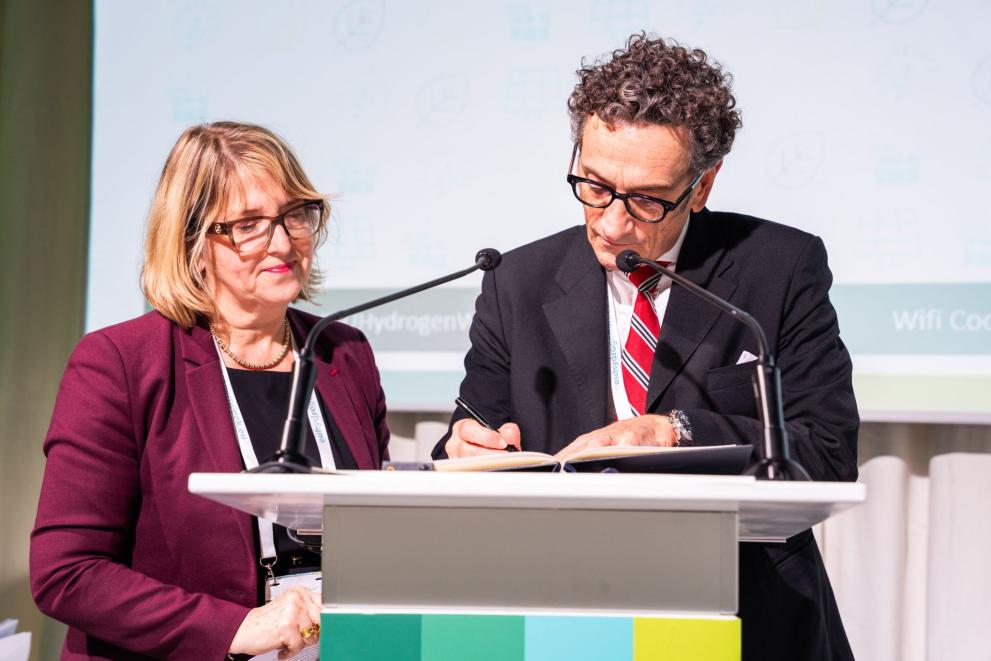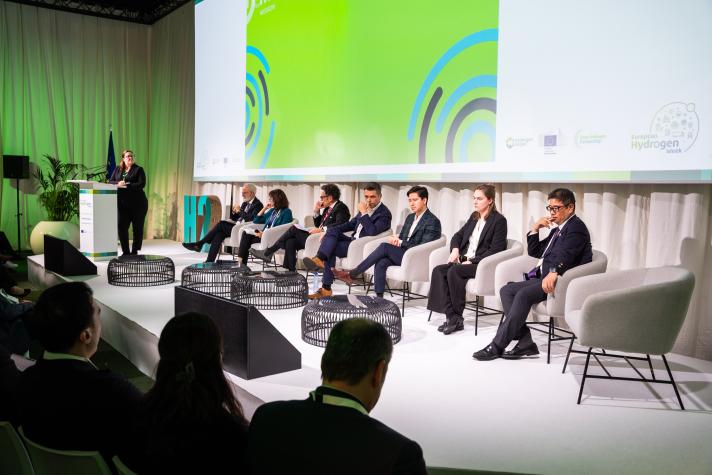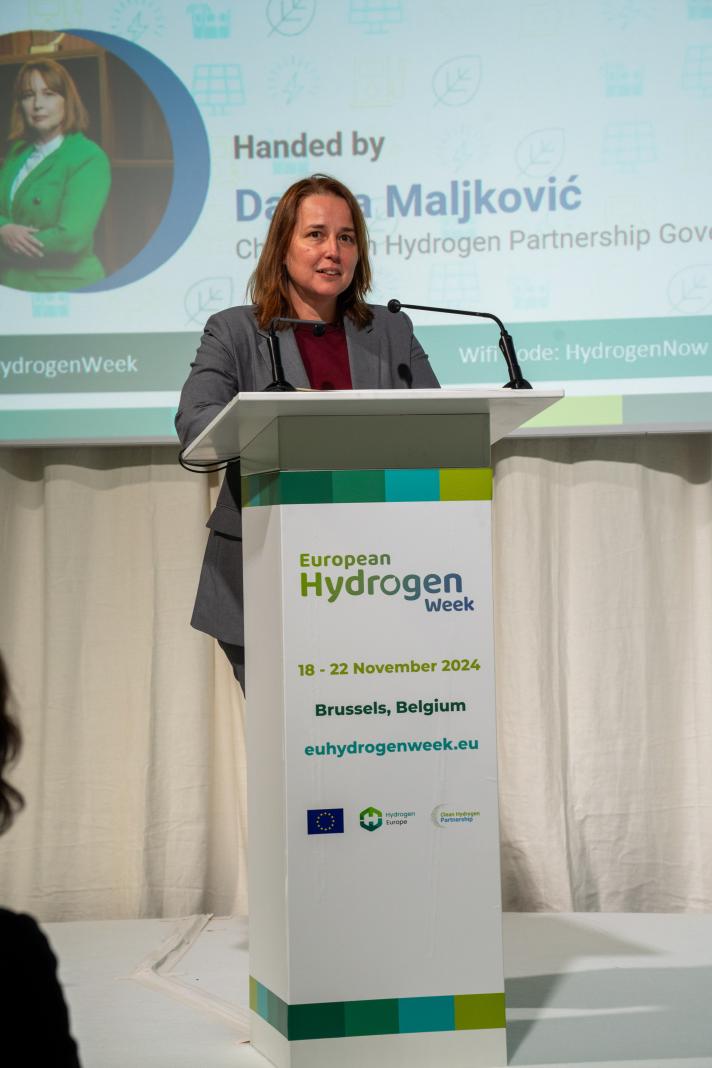
At this year’s European Hydrogen Week, speakers united in increasing calls to step up collective efforts, collaboration and provide sustainable funding for R&I to ensure the EU continues to play a critical role in transforming the hydrogen energy sector and maintain its industrial competitiveness on the global market.
The European Hydrogen Week took place on18-22 November 2024 in Brussels, where policymakers and industry were updated on the state-of-the-art technologies being developed and the Clean Hydrogen Partnership presented innovative results of its funded projects.
The European Union faces the dual global challenges of climate change and energy security, which are being addressed through the urgent development of low-emission, adaptable energy technologies such as hydrogen, to meet its 2050 emission reduction targets.
Valerie Bouillon-Delporte, Executive Director of the Clean Hydrogen Partnership stated in the opening of the event that the partnership’s road was clear — to help accelerate the development and deployment of a European value chain for safe and sustainable clean hydrogen technologies: strengthening its competitiveness particularly to support SMEs and accelerating the market entry of innovative, competitive clean solutions.
‘We need to continue bringing together industry, research and public sectors. We are very happy to be taking such a challenge on board,’ she said.
She added: ‘The clean hydrogen policy is a bold and a forward-looking roadmap, addressing critical challenges in R&I while reinforcing the strategic priorities that underpin our shared vision for a sustainable share future.’
The Innovation Forum segment of the conference, a premiere this year, spearheaded by the Clean Hydrogen Partnership, featured presentations, and discussions on the whole hydrogen value chain — which included strategies for increasing EU competitiveness and skills, synergies with end-use sectors and innovative hydrogen tech for mobility.
The Forum was also an opportunity to assess progress in driving forward the Clean Hydrogen Partnership’s agenda, showcase its projects and cast a forward look towards its future ambitions.
Mirela Atanasiu, Head of Unit Operations and Communications at the Clean Hydrogen Partnership, presented the latest results of the partnership, which has been working for more than 16 years to deliver ground-breaking, market-based hydrogen solutions. "The Innovation Forum at the European Hydrogen Week serves as a pivotal platform, showcasing the latest advancements and groundbreaking projects across the hydrogen value chain. It underscores our commitment to fostering EU competitiveness, enhancing skills, and advancing Hydrogen Valleys, " she said.
The Clean Hydrogen Partnership recently published its 2024 Programme Review Report which provides a snapshot of its eight pillars of work being driven forward through a multi-annual work plan and cross-cutting activities. Ms Atanasiu highlighted some of these major project achievements to support industry in reducing costs and scale up production, including through underground storage facilities, clean heating power and mapping hydrogen energy’s potential in Africa.
“The Programme Review Report underscores the pivotal role of our public-private partnership in advancing hydrogen technologies. By evaluating 98 active projects against state-of-the-art targets and key performance indicators, we gain critical insights to steer Europe's decarbonization efforts and enhance global competitiveness", Ms Atanasiu concluded.
De-carbonising sectors through sustainability and circularity
As the EU’s continues to transition towards a sustainable and secure energy future, the common thread running throughout the week’s policy sessions was on the best approach to further scale up clean, safe, and sustainable hydrogen technologies.
Underpinning these discussions were the EU’s hydrogen strategy, REPowerEU Plan and the European Green Deal objectives, which establish a comprehensive framework to support the uptake of renewable and low-carbon hydrogen.
Much of the forum’s focus was on how to further support the EU to reach these goals through scaling up technologies, increasing investment and competitiveness, and ultimately increase capacity production of clean hydrogen.
Chair of the Governing Board, Danica Maljković delivered a strong message in the opening of the forum : “we must focus the investments where they matter most. We must promote cutting edge innovations and envision Europe as a clean, self-sustained energy hub, a continent of affordable H2 energy.”
Rosalinde van der Vlies, Clean Planet Director at the Directorate-General for Research and Innovation and Vice Chair of Clean Hydrogen Partnership’s governing board, shared the European Commission’s vision for further building the hydrogen economy and outlined three key messages on future opportunities: seizing the new political momentum to increase competitive industrial clusters, harnessing the crucial role of research and innovate and highlighting the updated priorities of the incoming Commission.
“The European Commission is committed to continue investing in hydrogen, in close coordination with Member States and the private sector. Exciting times lie ahead”, she concluded, urging to build on the success of the JU to tackle challenges we are facing: moving from niche to scale, working on the affordability of hydrogen, while passing on clear messages on what the sector needs.
The EU is supporting the Clean Hydrogen Partnership with EUR 1 billion up to 2027, complemented by at least an equivalent amount of private investment, and has provided an additional EUR 200 million through REPowerEU to double the number of hydrogen valleys in Europe by 2025. Plans by the new Commissioner for Start-Ups, Research and Innovation, Ekaterina Zaharieva, include reducing administrative burdens for funding allocation.
Strengthening regional networks and scaling up hydrogen valleys
Building on the success of its work with Europe’s regions since 2014, the Clean Hydrogen Partnership has increased support for developing clean local hydrogen-based economies.
Following a call of expression of interest last year, 10 new regions were selected to enter a structured cooperation with the Clean Hydrogen Partnership.
Three memoranda of cooperation were signed last June and at this year’s forum a further six were signed by the Clean Hydrogen Partnership with the regions of Castilla y León (Spain), North-Holland (The Netherlands), Košice Region (Slovakia) and Wielkopolska (Poland): , as well as with the Médio Tejo Intermunicipal Community (Portugal) and the National Managing Authority from Slovenia. The aim of these agreements, tailored to the needs of each member, is to create a more robust and mutually beneficial partnership framework, including through knowledge transfer and capacity building.
‘We will continue supporting the REPowerEU Plan which aims to double the number of hydrogen valleys by 2025,’Valerie Bouillon-Delporte said. ‘So far 16 valleys are being funded. We will add six additional valleys this year. These are a game-changer and truly illustrate their strategic importance in building a robust hydrogen valley chain and fostering industrial synergies across Europe.’
In addition, the future Clean Hydrogen Knowledge Hub will provide industry and other partners with the information they require to innovate, allowing for automated data analysis and reporting to support decision making through collaboration.
Regions interested in becoming hydrogen valleys were also encouraged to engage with the Clean Hydrogen Partnership’s Mission Innovation Hydrogen Valley Platform, which provides insights on advanced technologies, funding, management practices, barriers and project success factors from hydrogen valleys around the globe.
Promoting wider global collaboration
A recurring theme throughout the week was the importance of strong international research and innovation collaboration, strategic planning and coordination through partnerships and across borders.
A session dedicated to advancing hydrogen technologies on the wider global landscape brought together speakers from the Mission Innovation platform and the International Partnership for Hydrogen and Fuel Cells in the Economy (IPHE) to discuss shared ambitions as well challenges and, importantly, how to harness the opportunities these presented.
Luis Umanzor Hernandez from the UN Industrial Development Organisation noted how shared learning from hydrogen valleys was informing green hydrogen clusters, a key element of their global hydrogen programme.
Clean Hydrogen Partnership signed a Memorandum of cooperation with the Clean Hydrogen Mission - Mission Innovation, committing to continue advancing clean hydrogen technologies through key initiatives such as creating an enabling environment through global events, expanding Hydrogen Valleys with strategic tools or enhancing knowledge management with shared platforms. “The partnership is doing a fantastic job, and we need to strengthen cooperation and continue developing hydrogen valleys worldwide,” stated Piero Venturi, Director of Clean Hydrogen Mission - Mission Innovation.
Equipping the future skills workforce
Education, training and outreach to meet the rapidly changing labour skill demands were key themes at the Forum. Discussions highlighted the pressing need to bridge existing skills gap by equipping the next generation with the tools to roll out hydrogen technologies, including through practical, targeted training and forging more networks with industry. Industry, policymakers, and all stakeholders must join forces to ensure a skilled workforce capable of driving the hydrogen transition. The Clean Hydrogen Partnership’s education and training activities, having supported 16 projects over the last year, already form a good basis. Our HyAcademy.eu project has made significant progress by collecting detailed data on over 100 hydrogen-related university programs, building networks of universities and schools, prioritizing the development of educational materials, and preparing the framework for the Net-Zero Hydrogen Academy to enhance formal hydrogen education across Europe and train 100 000 workers within three years.
Recognising talent, innovation and success
A pitching session, co-organised by the EU-funded Greenet network and the NCP_WIDERA.NET project, provided an opportunity for participants from public and private sector organisations to share ways to harness the benefits from hydrogen energy and make production more cost efficient.
Further sessions examined advances in scaling up renewable hydrogen production, transportation and logistics technologies and setting the framework for standardisation in the fledgling industry. Participants also shared insights on the European Hydrogen Observatory, the UK’s National Gas FutureGrid key findings and the European Hydrogen Refuelling Station Availability System (E-HRS-AS).
Next steps for R&I moving forward
Looking beyond 2030, delegates discussed the wealth of opportunities for further driving forward the hydrogen agenda by continuing to design supportive policy frameworks, reducing regulatory barriers and scaling up infrastructure.
Luigi Crema, President at Hydrogen Europe Research called for ongoing funding for research into viable technologies, including for improving electrolysis research, the components for logistics and storage and fuel cells. He added that there should also be an intensified focus on advanced materials which are at the core of improving the performance of next generation technologies.
‘By 2040 Europe can be a continent where hydrogen flows as freely as gas does,’ said Danica Maljković, Chair of the Clean Hydrogen Partnership’s governing board. ‘Hydrogen is part of a new industrial revolution. Now is the time for Europe to truly lead not through declaration but through execution.’
Celebrating success in innovation and pioneering women
The 7th edition of the Clean Hydrogen Partnership Awards, held during the week, highlighted the best success stories, innovation, outreach, hydrogen valleys, and for the first time, the leading role of women in the sector.
Awards in the above categories were presented to EVERYWH2ERE for developing a portable hydrogen energy generator; to FCH2RAIL for innovations in retrofitting diesel trains to run on hydrogen; to FLAGSHIPS for demonstrating on the Rhine a retrofitted container vessel powered by hydrogen; and jointly to the Triērēs Valley in Greece and Hydrogen Valley Emsland in Germany.
The Women in Hydrogen Innovation Award, launched to encourage the participation of more women engineers and scientists, was presented to Deborah Jones, Research Director at CNRS and head of the laboratory for aggregates, interfaces and materials for energy at the Institute for Molecular Chemistry and Materials, Montpellier University, France.
Hydrogen Europe Research also presented their Young Scientist Award 2024, rewarding young researchers who have personally contributed to hydrogen-related projects.
The main organisers of European Hydrogen Week are Hydrogen Europe, Hydrogen Europe Research, the Clean Hydrogen Partnership and the European Commission. More than 9000 participants joined the four days of conferences, exhibitions and side events in the 2024 edition.
Details
- Publication date
- 27 November 2024
- Author
- Clean Hydrogen Joint Undertaking


